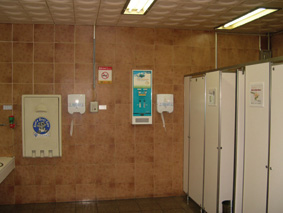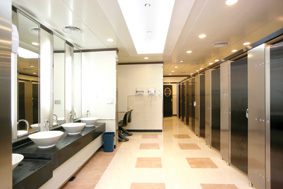
The Women Friendly Seoul 2010 project, launched in 2007, has been attracting more attention in recent months. With a sky blue background, and a white water drop in the middle, the project is being advertised on buses, on subways, and everywhere in Seoul. Called the Yeo-haeng Project, in Korean the name intentionally invokes the homophone “travel project,” as yeo-haeng is a word for travel in Korean. However, it stands for “making women happy” as Yeo is “women” in Korean and haeng, “happy” in Korean.
The Women Friendly Seoul 2010 project was at first proposed by Oh Se-hoon, the current mayor of Seoul and the Seoul Metropolitan Government. They first promoted the project to increase the competitiveness of Seoul as a global city by making it cleaner and more attractive city, and one of its goals was to make women residing in Seoul happy through various projects. Its goal was to accomplish 90 small projects under five different themes: “caring Seoul,” “fully employed Seoul,” “fruitful Seoul,” “safe Seoul,” and “comfortable Seoul” by the year 2010.
193 experts on women’s studies have been employed as a consulting group. A few examples of the Women Friendly Seoul 2010 project that have been accomplished already are installing flat manhole covers and blocks on streets for women walking with high heels, increasing the number of toilets for women in public bathrooms, and placing nursing rooms in public theaters and auditoriums.
According to one staff member of the Women Policy Division (WPD) of SMG, the city is currently focusing on nursing and child care services to give women more leisure time. Another goal of their services is to increase ’s low birthrate. SMG is also seeking to improve the security level of Seoul by making designated parking lots for women and installing brighter streetlights.
Many professors from Ewha’s Department of Women’s Studies and Korean Women’s Institute have participated in the project as some of its 193 consultants; through no specific aspects of the project target women’s universities.
Students are generally satisfied with the Seoul government’s plan. “I found out about the project when I was sitting on a bus. At first, I was confused since it sounded way too simple, but that led me to search for more information about the project, and now, I am thrilled to see the changes slowly being made around the city,” said Hong Yeon-hwa (Social Science, 1).
Some, however, think that SMG should be more focused on specific areas of need. “Considering that some women do not wear high heels, I think it is more appropriate for the metropolitan governemtn to advertise its efforts made in security and child care, rather than simply changing man holes,” said Professor Sohn Seong-young (Dongduk Women’s University), an expert in women’s studies. “If Seoul’s more practical recommendations for preventing problems like sexual crimes are implemented, Seoul will become a happier and more developed city,” added Sohn.


